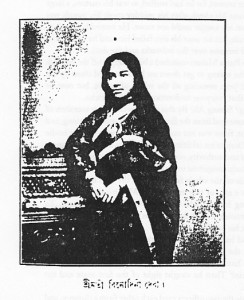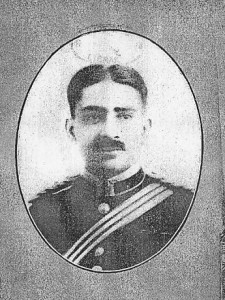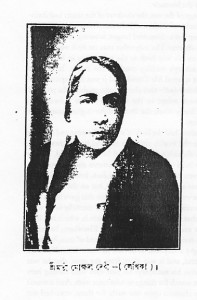After the defeat and surrender of General Tonwshend’s Indo-British forces at Kut al-Amara, Capt Kalyan Mukherji was sent to a prisoner-of-war camp at Ras al-‘Ain. This town is now technically in Syria, but it lies right on the Turkish border.
In 1916, when the Indian POWs came to Ras al-‘Ain, a great number of Armenians were incarcerated in concentration camps around the town. This was the most terrible phase of the Armenian genocide and the Indian POWs would certainly have known what was happening in the camps around them. Capt. Mukherji’s contemporary and fellow-prisoner, Sisir Sarbadhikari, refers frequently to the mass slaughter of Armenians in his war memoir Abhi Le Baghdad (which I shall be writing about soon): indeed his book suggests that the lives of Indian and Armenian prisoners sometimes became quite intricately intertwined. But there are no references to Armenians in the postcards Kalyan Mukherji sent home from Ras el-‘Ain. His messages were very brief and were meant principally to allay his family’s anxieties; in any case they would have been written with the camp’s censors and guards in mind.
Here is Mokkhoda Debi’s account of the final chapters of her grandson’s life.
4. After reaching Ras el-‘Ain Kalyan sent his mother a few lines on a postcard, in English, on June 15th (1916). This is the Bangla translation of what he wrote: ‘They give us very good, fresh food. We are eating lots of milk, almonds, rotis and fish. Our faces have regained their colour and our strength has returned. Puri and I are still together. I’ll feel still better if I receive a letter from you. We are all well.’
…
6. From long before that month [Kalyan’s mother] Binodini’s

health had been declining, because of her anxieties about her son. Then something happened that made her condition even worse. In the month of June she received news from Cooch Behar, that Kalyan’s daughter had died, at his in-laws’ house, of an illness of the stomach. After this terrible news, Binodini never left her bed again: her health broke down completely and she lost all her strength.
7. Kalyan came to know about his daughter’s death and his mother’s illness from our letters and after that he wrote to his mother every month, trying to give her hope and strength. What those short, four-line letters said in sum, was this: ‘ Ma you must look after yourself, you must get better. I really want to see you – I will soon be home again. Don’t go away before I come. So what if my first child died? You lost yours too. When I come home again, I will have many children, don’t worry about that. I am desperate to hear from you, to receive your letters. If you are unable to write yourself, then let my wife take down the words from your lips. I’ll be really happy if I hear from you… I am fine here but I worry a lot about you.’
9. On October 29 it was as if Binodini knew that her life would end that day. Her younger son Kamal’s second child had been born 12 days before. From the morning onwards Binodini began to ask to see the newborn’s face, so the child was brought to her from his uncle’s house.
10. Many relatives went to see Binodini that day – she took her leave of all of them. She even predicted the exact time when she would take leave of this world.
11. That day, it rained through the evening and into the night. Seeing how hard it was raining, Binodini prayed: ‘Dear God, please don’t drench those who will have to go to perform my last rites.’ Her prayers seemed to find a loving reception. At ten the rain stopped, and shortly afterwards, at midnight, Binodini eluded the sorrows of this world and made her escape.
It rained no more than night. The next day it was sunny until 5 pm and then it started to rain again. Needless to say, those who went to perform Binodini’s last rites were not drenched.
[410-3]

1. That October we received two postcards from Kalyan. Word of his mother’s death was sent to him in November, but we learnt later, from his friend Dr. Puri, that the news did not get there till March 3rd (1917).
2. We received no letters from Kalyan in December (1916). Towards the end of January 1917 two postcards arrived. They said: ‘A terrible sickness has hit our camp§. Many have fallen very ill. Dr. Puri fell ill too. It took me two months to save him. I didn’t have time to write.’
3. After that we received a letter written by Kalyan in February 1917 and another in March. There was no indication in them that he had heard of his mother’s death. He wrote only: ‘many are dying, if they don’t move us from here no one may survive.’ [415]
4. In April there was no news of Kalyan. Then on May 21st we read in the newspapers ‘Capt. Kalyan Mukherji died of a deadly illness on 18th March.’
5. Later, on May 25th , we received a grief-stricken letter from Dr. Puri. He wrote to say ‘Kalyan saved my life with his own hands. But I was unable to save him. I tried everything. It was my fate!!! I saw to it that his last rites were performed – as far as the conditions here would permit – to my satisfaction. And I will see to it that a marble plaque, with an inscription, is placed upon his memorial.
‘On the 3rd of March Kalyan received a letter with news of his mother’s death – after that he lost interest in everything. He ate much less and couldn’t sleep at night. On March 9 he fell ill with a slight fever. Over three days his condition worsened. From March 12 he became delirious. But his enunciation was quite clear even in his delirium; he spoke in Bengali – words poured out of him. Even though I and the other doctors could not understand exactly what he was saying we knew he was talking to his mother. His grief was so great that there was no mistaking it. After six days, on March 18, his delirium ceased. And later that night it was all over.’ (416-7)
The ending of the narrative, and the manner in which the final parts are shaped, suggests that Mokkhoda-debi believed that Capt. Mukherji’s life had ended in a fashion that mirrored the death of his mother.

She writes of the death of her grandson and her daughter as if both had been brought about, ultimately, by the same cause: the grief of separation – biraha. It is as if, in writing the coda to their lives, she were invoking an ancient lament, sung over the centuries, by women whose menfolk had left home to serve as sepoys.
(the page references are to Kalyan Pradeep: Captain Kalyan Kumar Mukhopadhaya, I.M.S.-er Jiboni, by Mokkhoda Debi (Kolkata, 1928) [‘Kalyan Pradeep: The Life of Captain Kalyan Kumar Mukherji, I.M.S.’] The translations are mine.)
I was recently informed that a free pdf of Kalyan Pradeep can be obtained on the website of the Digital Library of India. Shri Venu Madhav Govindu, who wrote to me about this, has since added a clarification: ‘the DLI site only provides individual scan images and visitors to DLI will not be able to grab a pdf directly … they will need to download the individual pages (not easy if you dont know computer programming) and put them together into a single pdf.’
___________________________________
§ He was probably referring to typhoid which also devastated the Armenian camps.
